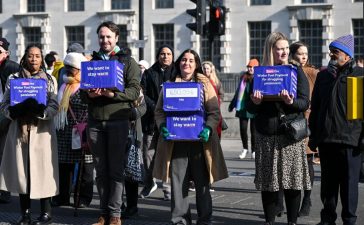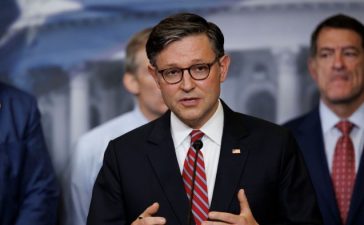Glen says Infected Blood Compensation Authority being set up, with Robert Francis as interim chair
John Glen, the Cabinet Office minister, starts by reiterating the apology delivered by Rishi Sunak yesterday to victims of the infected blood scandal.
And he thanks Sir Brian Langstaff for his work.
He says meeting people from the infected blood community as he finalised details of the compensation was the greatest privilege of his ministerial career.
He says there will be a further chance for MPs to debate the report after the Whitsun recess.
And the government will respond to the recommendations as soon as it can.
The government will pay comprehensive compensation to those infected and affected, he says.
He says an Infected Blood Compensation Authority is being set up. Sir Robert Francis will be the interim chair of the organisation. (Francis produced the interim report on how a scheme should operate.)
Glen says people who have been infected with infected blood products will be eligible to claim compensation. And if an eligible person has died, compensation will be paid to their estate.
And he says that, when a person with an eligible infection is accepted, their loved ones will be able to apply for compensation in their own right.
People already registered with the scheme already established will automatically be considered for compensation, Glen says.
Key events
Glen said the compensation scheme would be tariff based.
He said the infected blood community would be consulted before the precise terms of the scheme are set in regulations.
He said the scheme would be flexible. People will be able to take a lump sum, or regular payments, he said.
And he said payments would be exempt from income tax, capital gains tax and inheritance tax. And they would be disregarded for people being assessed for means-tested benefits, he said.
Glen says yesterday’s report said compensation should be paid in five categories: an injury award acknowledging “the physical and mental injury caused by the infection”; a social impact award “to address the stigma or social isolation as a result of the infection”; an autonomy award, acknowledging how family life was disrupted; a care award to cut to compensate for past and future care needs; and a financial loss award for past and future financial losses suffered as a result of the infection.
Glen says this recommendation is being accepted, with “two small refinements”.
The care award will go directly to the person infected, or their estate, he says.
And the financial loss award will be paid to people infected, or to their estate if they have died, he says.
Glen says Infected Blood Compensation Authority being set up, with Robert Francis as interim chair
John Glen, the Cabinet Office minister, starts by reiterating the apology delivered by Rishi Sunak yesterday to victims of the infected blood scandal.
And he thanks Sir Brian Langstaff for his work.
He says meeting people from the infected blood community as he finalised details of the compensation was the greatest privilege of his ministerial career.
He says there will be a further chance for MPs to debate the report after the Whitsun recess.
And the government will respond to the recommendations as soon as it can.
The government will pay comprehensive compensation to those infected and affected, he says.
He says an Infected Blood Compensation Authority is being set up. Sir Robert Francis will be the interim chair of the organisation. (Francis produced the interim report on how a scheme should operate.)
Glen says people who have been infected with infected blood products will be eligible to claim compensation. And if an eligible person has died, compensation will be paid to their estate.
And he says that, when a person with an eligible infection is accepted, their loved ones will be able to apply for compensation in their own right.
People already registered with the scheme already established will automatically be considered for compensation, Glen says.
Sir Lindsay Hoyle, the speaker, starts by saying that more time than usual has been set aside for this statement.
That means it could last well beyond an hour.
Cabinet Office minister John Glen to make statement to MPs on compensation for infected blood scandal victims
John Glen, the Cabinet Office minister, is about to deliver a statement to MPs on compensation to victims of the infected blood scandal.
Rayner says Labour will aim for its new town developments to have 40% social or affordable homes
Angela Rayner, the deputy Labour leader and shadow levelling up secretary, gave details this morning of the “new towns code” that Labour will apply to decide where new towns can be built.
Labour would not just be demanding “more units, at any cost,” she said.
She went on:
The reason many local communities resist new homes is often because the housing is of the wrong type, in the wrong place – it doesn’t come with the schools, GP surgeries and green spaces that make communities, not just streets.
Or the affordable and social housing local people need.
Our next generation of new towns will build homes fit for the future. Creating places where people want to live. Inspired by garden suburbs like Hale in Manchester, Roundhay in Leeds, and the Garden City project.
We will set out a new towns code – criteria that developers must meet in these new settlements:
-More social and affordable homes – with a gold standard aim of 40 per cent
-Buildings with character, in tree-lined streets that fit in with nearby areas
-Design that pays attention to local history and identity
-Planning fit for the future, with good links to town and city centres
-Guaranteed public transport and public services, from doctors’ surgeries to schools
-And access to nature, parks, and places for children to play.
New towns are just one way we get good quality, affordable houses built in the national interest.
Our local housing recovery plan will reverse the Conservatives’ damaging changes to planning, getting stalled sites moving at speed.
Peter Walker has more from the speech here.
Home Office publishes Walney review on political violence, with Sunak promising to study recommendations in detail
Rishi Sunak said this morning that the government would be carefully studying the proposals in the report from John Woodcock (Lord Walney) on political violence. Speaking in Austria, Sunak said:
Extremism has no place in our society. Threatening or intimidating behaviour that disrupts the lives of ordinary hardworking people isn’t acceptable.
I have been very clear about that, I want to make sure the police have our full backing and the powers they need to clamp down on it.
That is why we have given them those new powers, making sure that we can ban the use of face coverings, flares, pyrotechnics, climbing on war memorials …
Of course, we will study Lord Walney’s recommendations in detail, but I am very clear it is not the British way to behave in an intimidating or threatening manner and we will make sure the police have our full support and backing in clamping down on that type of behaviour.
The Home Office has just published the Walney review, entitled Protecting our Democracy from Coercion. Michael Gove, the levelling up secretary, was more complimentary about it this morning (see 10.58am), but ministers have not given a firm commitment to supporting its recommendations.
Woodcock was commissioned to write the report more than three years ago and he has been briefing reporters on some of his proposals for some months now.
Here is the press summary of the judgment in the case against the Home Office on protest law won by Liberty this morning. (See 11.18am.) And here is the full judgment.
Here is the full text of Michael Gove’s speech this morning on antisemitism.
Mel Stride, the work and pensions secretary, has said that welfare reform can help “uncover the treasure that is the hidden talent in our country”.
In a speech this morning on reforming the benefits system, Stride said:
I want to use the power of welfare reform to uncover the treasure that is the hidden talent in our country, to unleash the potential in communities that have too often been overlooked.
Of course, our tools in this endeavour are wide-ranging, reflecting the different approaches that we are taking, from the fine chisel and soft brush for tailored and targeted support to boost skills and help recruit people into high demand sectors; to the large-scale excavator helping to deliver our structural reform, ensuring welfare supports and reflects the changing modern world.
As PA Media reports, in an extended metaphor comparing the benefits system to archaeological discovery, Stride said he wanted to ensure “everyone who is able to work has the best possible chance of staying or returning to employment”.
Stride is also launching a major advertising campaign intended to get firms with staffing shortages to make better use of jobcentres.
IMF tells UK not to cut taxes as it warns over £30bn fiscal hole
The International Monetary Fund has signalled its opposition to pre-election tax cuts from Jeremy Hunt as it warned the government of a looming £30bn hole in the UK’s public finances, Larry Elliott reports.
Graeme Wearden has more on what the IMF has been saying on his business live blog.
Sunak says ICC’s request for arrest warrant for Israeli PM ‘deeply unhelpful development’
Rishi Sunak has described the international criminal court’s request for an arrest warrant to be issued against the Israeli PM Benjamin Netanyahu as “a deeply unhelpful development”.
Speaking in Vienna, Sunak went on:
Of course it is still subject to a final decision, but it remains deeply unhelpful nonetheless.
There is no moral equivalence between a democratic state exercising its lawful right to self-defence and the terrorist group Hamas …
It is wrong to conflate and equivocate between those two different entities.
What I am very clear is that this will make absolutely no difference in getting a pause in the fighting, getting aid into the region, or indeed the hostages out.
The US president Joe Biden described the ICC’s move as “outrageous”.
Court says Home Office acted unlawfully when it tightened anti-protest law without fair consultation
Regulations which lowered the threshold for police intervening in protests were unlawful, the high court has ruled. PA Media reports.
Civil liberties group Liberty brought legal action against the Home Office over protest regulations passed by statutory instrument last year.
The government measures lowered the threshold for what is considered “serious disruption” to community life, from “significant” and “prolonged” to “more than minor”.
They also allowed police officers to take into account “any relevant cumulative disruption” of repeated protests.
The regulations came after the government tried to introduce the same changes when the public order bill went through parliament, but they were rejected by the Lords at the time by 254 votes to 240.
The step to restore the provisions by statutory instrument, which faces less scrutiny than primary legislation, was criticised at the time but passed last year.
At a hearing in February, lawyers for Liberty asked the High Court to quash the “unlawful” provision.
And in a ruling this morning, two judges ruled for the group, finding the Home Office acted outside of its powers by reducing the threshold and failed to carry out a fair consultation process.
Lord Justice Green and Mr Justice Kerr said: “As a matter of ordinary and natural language ‘more than minor’ is not within the scope of the word ‘serious’.”
After the ruling Akiko Hart, Liberty’s director, said:
This ruling is a huge victory for democracy and sets down an important marker to show that the government cannot step outside of the law to do whatever it wants.
We all have the right to speak out on the issues we believe in and it’s vital that the government respects that.
These dangerous powers were rejected by parliament yet still sneaked through the back door with the clear intention of stopping protesters that the government did not personally agree with, and were so vaguely worded that it meant that the police were given almost unlimited powers to shut down any other protest too.
This judgment sends a clear message that accountability matters and that those in power must make decisions that respect our rights.
Q: Will the government delay brining in the Higher Education (Freedom of Speech) Act if it becomes clear it could allow more antisemitic speech at universities? It could be used to defend someone giving a speech on Holocaust denial.
Gove says the government wants universities to be spaces where free speech is uphold, but where people are not intimidated.
Gove says government should consider making organisers of repeat pro-Palestinian marches pay policing costs
Q: What do you want protest organisers to do to stop antisemitism on pro-Palestinian marches?
Gove says they should be clear what is not acceptable, including slogans and symbols.
But there are things government can do too, he says. The Woodcock report addresses this, he says. He says the police could take into account the cumulative impact of marches on certain communities.
And he says it is “certainly worth considering” whether organisers of these marches should be liable for the policing costs if they insist on holding events “again and again and again”.
Gove is now taking questions.
Asked if the UK would enforce an arrest warrant issued by the international criminal court against Benjamin Netanyahu, the Israeli PM, Gove says he is not a laywer, but he says it was wrong for the ICC to imply equivalence between Israel and Hamas.
Gove says he wants to appoint independent adviser to deal with anti-Muslim hatred, to match antisemitism adviser
Gove says the report being published by John Woodcock today on political violence is “brilliant” in its analysis.
And he says its recommendatons are compelling and far-reaching. He goes on:
Some will require detailed debate and thought, but that cannot be an excuse for delay in dealing with the challenges that he addresses. We must make rapid progress to deal with the intimidatory consequences of marches.
He says the government needs to bolster the role of the independent adviser on antisemitism. And he says he will establish a parallel adviser on anti-Muslim hatred.











